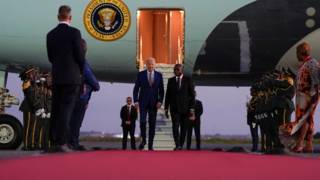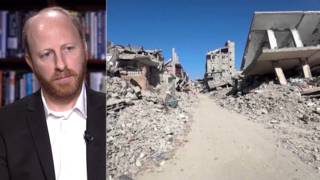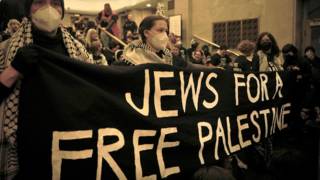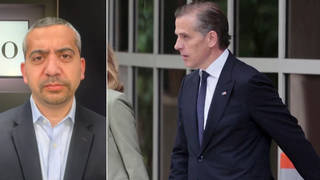
Related
Guests
- Allan Nairnaward-winning journalist and activist.
“Bin Laden is dead, but the world is still governed by bin Ladens. People cheer because they thought they saw justice, but this was not justice delivered by victims. This was one killer killing another,” says Allan Nairn. “I think we need an American uprising, if we’re to put a stop to this kind of killing of innocent people. And we need an American Romero, someone like Archbishop Romero of Salvador.” [includes rush transcript]
Transcript
AMY GOODMAN: I wanted to bring Allan Nairn into this conversation. Your response to the news and what you think this could mean? Could this mean the end of the U.S. war with Afghanistan?
ALLAN NAIRN: I don’t think it will. It should. It definitely should be an occasion for rethinking everything on a much bigger scale than Afghanistan.
The first thing that struck me was seeing the Americans out in the streets celebrating outside the White House, outside the old World Trade Center site, people cheering, people exultant. And while some of that may come from bloodlust, I think a lot of it comes from a sense of justice. People like justice. They want to see it. And in this case, I think many people have the feeling, well, he got what he deserved. This was a man who had massacred civilians; he got what he deserved. And there’s a lot of truth to that. But if we recognize that someone who is willing to kill civilians en masse, someone who is willing to send young people out with weapons and bombs to, as President Obama put it, see to it that a family doesn’t have a loved one sitting at the dinner table anymore, see to it that a child and a parent never meet again, if we say that someone like that deserves to die, then we have to follow through on that idea, and we have to recognize, OK, if these things really are so enormous, we have to stop them. Killing bin Laden does not stop them. Bin Laden is dead, but the world is still governed by bin Ladens. People cheer because they thought they saw justice, but this was not justice delivered by — a kind of rough justice delivered by victims. This was one killer killing another, a big killer, the United States government, killing another, someone who’s actually a smaller one, bin Laden. And the bin Laden doctrine that, to take out the CIA office that was at the World Trade Center, it’s OK to blow up the whole World Trade Center, to teach Americans a lesson, it’s OK to slaughter thousands of Americans — that doctrine lives on in the American White House, in the American Pentagon. You know, every day — and in seats of authority all over the world.
Every day, the U.S., directly with its own forces, or indirectly through its proxy forces, its clients, is killing, at a minimum, dozens of people. I mean, just since Obama came in, in the one limited area of drone strikes in Pakistan, something like 1,900 have been killed just under Obama. And that started decades before 9/11. We have to stop these people, these powerful people like Obama, like Bush, like those who run the Pentagon, and who think it’s OK to take civilian life. And it doesn’t seem that they can be stopped by normal, routine politics, because under the American system, as in most other systems, people don’t even know this is happening. People know the face of bin Laden. They know the evil deeds that he’s done. They see that he is dead, and they say, “Oh, great, we killed bin Laden.” But they don’t see the other 20, 30, 50, 100 people who the U.S. killed that day, many of them children, many of them civilians. If they did, they probably wouldn’t be out in the street cheering about those deaths.
We’ve got to stop this practice. And Americans aren’t doing it. Egyptians, Tunisians are doing their part. They’ve risen up against the repression they face. I think we need an American uprising, if we’re to put a stop to this kind of killing of innocent people. And we need an American Romero, someone like Archbishop Romero of Salvador, who, in the face of massacres, of daily massacres of what in the end was more than 70,000 Salvadorans, stood up and said to the army of his country, “Stop the repression. Defy your orders to kill, because there’s a higher principle.” About a little more than a week ago, I was in El Salvador and visited Romero’s old home, which I had never been to before, and saw that on his bookshelf he had Why Not the Best?, a campaign book by Jimmy Carter, which he had apparently been reading. Romero wrote to Jimmy Carter in his capacity as the archbishop in 1980, asking Carter to stop supporting the Salvadoran military that was slaughtering his people. And from what I know of Romero, he probably really believed that Carter would respond. He didn’t. Carter kept sending the aid. And within weeks, Romero himself was assassinated by death squad, that had originated from U.S. backing. Writing letters didn’t work in that case. And it doesn’t work here. You know, we’ve got to put a stop to this. Bin Laden is dead. And bin-Ladenism, if you want to call it that, should die also.
AMY GOODMAN: We’re going to break and come back to this discussion. Allan Nairn, award-winning journalist. This is Democracy Now!, democracynow.org, The War and Peace Report. When we come back, we’re going to be joined by a former Defense Intelligence Agency analyst. Stay with us.












Media Options